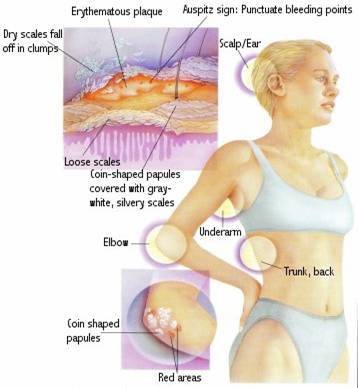Psoriasis is a chronic autoimmune condition where the skin grows much faster than normal skin. It is a non-contagious skin condition. The areas that are most commonly affected are the scalp, elbows and knees, forearm and shin but it can occur anywhere on the body including nails. The patient may also get arthritis.

Signs and symptoms
The severity of psoriasis vary from person to person. The signs and symptoms include :
- Shedding of scales of skin
- Red scaly patches on scalp, elbows, knees and other parts of the body.
- Itchiness
Types of psoriasis
- Plaque psoriasis is the most common
- Guttate psoriasis is found mostly in children.
- Eryhtrodermic psoriasis is severe form that requires hospitalisation
- Inverse psoriasis which affects body folds
- Pustular psoriasis- a more severe form of psoriasis which can be painful
 Guttate psoriasis |
 Plaque psoriasis |
Complications
Psoriasis can cause arthritis known as psoriatic arthritis. Symptoms are pain, throbbing or swelling in a few or many joints. The joints that are commonly affected are:
- Terminal joints of the fingers or toes
- Lower back, wrist, knees or ankles
Treatment (Depends on the type, severity and site of the lesion)
Creams and medicine can relieve symptoms.
Moisturising
- It is important to keep your skin moist over the affected areas. You should :
- Use a soap substitute such as aqueous cream or on emulsificant oitment if the skin is very scaly
- Keep fingernails and toe nails short to prevent damage to the skin from scratching
- Use the moisturiser immediately after bath
Medication and cream
- Doctors will prescribe medications including :
- Coal tar preparation, cortisone and other emollients.
- Methotrexate, Neotigason, Cyclosporine or Calcipatriol
- Biologics
- Phototherapy – narrowband UVB and PUVA
Where to get help?
Go the nearby health facilities and ask your doctor. Your doctor will assess your condition and treat accordingly. If necessary, referral to a skin specialist is required depending on the severity of the disease.
Things to remember
Psoriasis is not contagious. There is no cure for psoriasis but long term treatment can control the problem. Lifestyle measures, such as moisturizing, quitting smoking and managing stress are beneficial.
| Last reviewed | : | 23 August 2019 |
| Writer | : | Dr. A. Khalek Abd Rahman |
| Accreditor | : | Dr. Jamilah Abdullah Dr. Zaiton Ahmad |
| Reviewer | : | Dr. Nazatul Shima bt. Abd Rahim |







